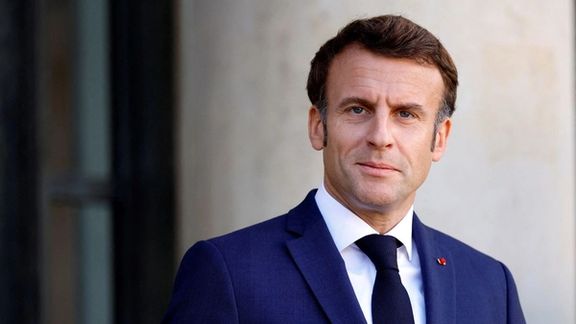France’s Macron Says Islamic Republic Has Told Many Lies

French President Emmanuel Macron has denounced “lies” by Iranian authorities in face of the “unacceptable” imprisonment of French nationals.

French President Emmanuel Macron has denounced “lies” by Iranian authorities in face of the “unacceptable” imprisonment of French nationals.
The Islamic Republic is holding more than a dozen French and other Western citizens on trumped-up charges of espionage or working against its security.
Macron in an interview with Le Parisien said that after the arrest of some French nationals “a lot of lies have been told.”
He stated that some French compatriots went to Iran for academic or other reasons adding that “there is nothing that justifies their imprisonment, it is unacceptable in our view,” assuring that French diplomacy would continue to “fight to free them.”
The Islamic Republic has detained at least seven French nationals on different charges including “spying for foreign intelligence services.”
Human rights organizations accuse Iran of a systematic policy of hostage taking over four decades from the earliest period of the Islamic republic after the ouster of the Shah, starting with the 1979-1981 siege at the US embassy in Tehran.

Tehran denies any policy of hostage taking and insists all foreigners are arrested and tried according to legal processes, while all such trials are held without transparency and due process. In addition, it has frequently shown readiness for prisoner exchanges and participated in swaps in the past.
In another part of his interview Macron said “I put very firm pressure on the Iranian president so that their rights are respected and that consular visits are possible. But above all, that we see them released as soon as possible.”
In early October, France accused the Iranian regime of “dictatorial practices” after Iran’s state TV aired the forced confessions of two French nationals arrested by the clerical-military government controlled by its 83-year-old anti-Western ruler, Ali Khamenei.
In the video of the forced confessions, one of the two French nationals - Cecile Kohler - said they were in Iran to “prepare the ground for the revolution and the overthrow of the regime of Islamic Iran.”
Iran’s state media are infamous for purported confessions by prisoners in politically charged cases. Such prisoners are held without due process of law and usually cannot choose their own defense attorney.
Deadly government violence against protesters in Iran has triggered a wave of tough criticism in the West in recent weeks. Germany and France, two powers are also signatories of the 2015 nuclear deal with Iran have adopted a strong stance against Tehran’s human rights violations.
Tensions mounted further between Tehran and Paris after Iran summoned the French ambassador November 30 over comments made by the country’s foreign minister in the National Assembly against the Islamic Republic.
Nicolas Roche was summoned to Iran’s Foreign Ministry over what Tehran called “unacceptable” remarks by Catherine Colonna which led to approval of a resolution in the assembly on human rights violations in Iran.
On November 28, the French National Assembly unanimously adopted a resolution offering “support for the Iranian people” and condemning the restriction of women's freedoms and rights.
President Emmanuel Macron's Renaissance party deputy Hadrien Ghomi, himself a descendant of Iranian immigrants, said the 149 votes in favor of the motion in the National Assembly “sent a strong message” to the world. The resolution condemns in the "strongest terms the brutal and widespread repression" against "non-violent demonstrators".